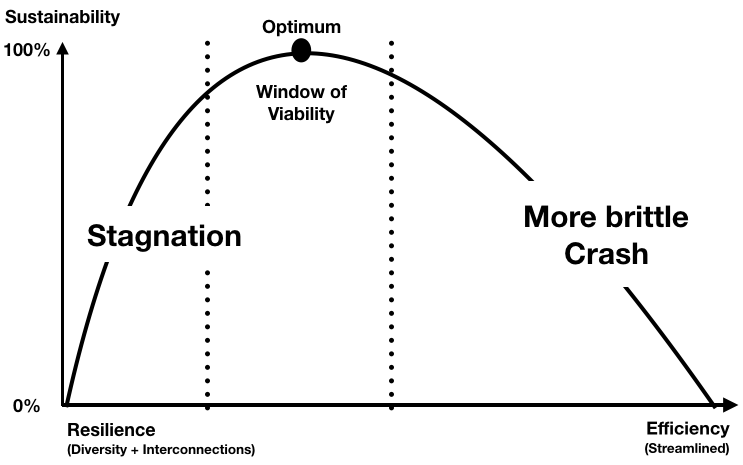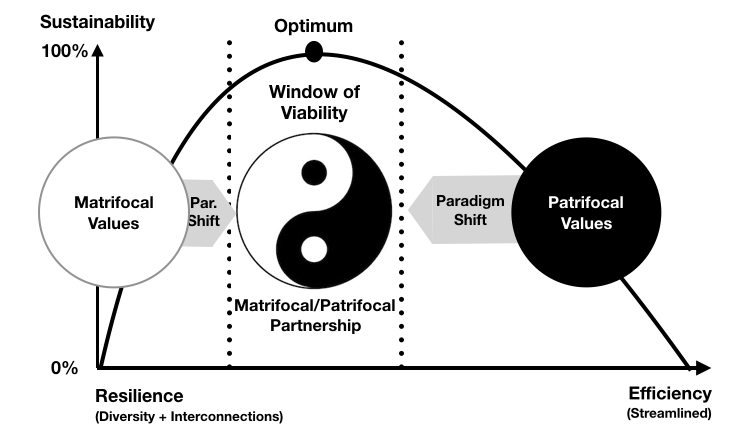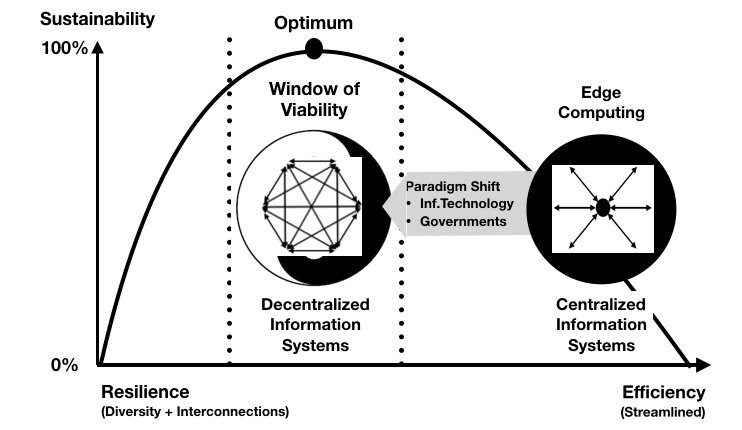Bernard Lietaer calls for three paradigm shifts - With specific actions by individuals and leaders.
With unsuitable means we half-heartedly try to repair the complicated clockwork of
our world. This gets us nowhere. It won't get us out of the crisis, because it will not result in a sustainable world.
The time has come to lead ourselves and our world through "three paradigm shifts".
First: Recognize and adhere to the law of sustainability
The book shows that in our world we are dealing with "living systems" that are
linked in many ways. With forests, our money, our society, and... and... and...
Our well-being depends on the future sustainability of these systems.
The "Law of the Sustainability of Living Systems", developed with other
experts, explains and specifies the principles of sustainability:
It says
that living systems are only sustainable if they achieve a balance between
productivity and elasticity. Balance, therefore, between short-term benefits of
long-term existence. Just like that of Yin and Yang - not an "either - or".
We violate
this law criminally. We have driven most living systems out of balance, making them non-sustainable.
Monocultures of all kinds, for example, emphasize short-term benefits and are
not even sustainable in the short term without massive additional costs, as
Lietaer shows with the example of forests and today's monetary system.
The book calls on readers to ensure that this law of sustainability is recognized and complied with. Both
as individuals and as leaders in business and politics, readers are challenged
to balance the short-sighted overvaluation of rapid return with the
preservation of resilience.
Second: Balance matrifocal and patrifocal values
In order to view our society within the framework of the law of sustainability, Bernard
Lietaer uses the terms "matrifocal" ("give and maintain") and "patrifocal" ("take and have"). Both men and women
follow this pair of values, each person according to their personal orientation.
From this point of view it becomes clear that here, too, we are violating the law of
sustainability. All over the world we live by patrifocal ("have")
values and neglect the matrifocal ("give") side of balance, as we can
see in our dealings with education, the elderly, people in need of care and
with each other.
Even though Lietaer sees signs of improvement, he does not only demand a fundamental change
in our values in this area. He invites his readers to become aware of these
values in themselves and to achieve their personal balance. Leaders must also
establish and maintain a matrifocal/patrifocal balance in their areas of
responsibility.
Third: Make personal information personal again
An extremely important system for the sustainability of mankind is the flow of
human information. It enables learning and solving problems together. This is
also why the “General declarations of human rights” declares unhindered flow of
information a principle human right.
The book shows that this system, which is essential for survival, is completely
out of balance. Companies have centralized flow of information and exploit it
to their advantage. We individuals have thus been dispossessed of our
information and, from the point of view of the law of sustainability the
information system has deeply slipped into the "productivity corner".
The answer is to make this system of human resources sustainable by restoring personal ownership of our information. This must be achieved jointly by both IT companies and governments
Change our view of how the world works
This chapter makes the reader aware that we must change our view of how the world works: That …
We depend on "living" systems of many kinds - like our food system, our forests, our monetary system, our cultural system, our climate system,
We can survive only if these are sustainable,
Sustainability of any living system results from balancing its resilience and efficiency.
The law of sustainability of living systems
Bernard Lietaer, with Sally J. Goerner and Robert E. Ulanowicz, (both leading scientists), in 2008 presented scientific proof that to attain sustainability living systems must reach a balance between efficiency and resilience - as presented by this graph:

Sustainability: Balance resilience and efficiency
Too much resilience leads to system stagnation.
Too much efficiency leads to system crash.
The law of sustainability ~ To reach optimum sustainability,
a living system must balance its efficiency and resilience.
Bernard and his friends found that all natural ecosystems operate within a window of viability around the optimal point of this balance. In other words, the optimal point is the ideal balance between efficiency and resilience. The window of viability defines the acceptable range before the balance is tipped too far one way or the other – reducing the system’s sustainability.
Complementary Forces
Both resilience and efficiency are related to the levels of diversity and connectivity found in the network, but in opposite directions:
A well-woven multiplicity of connections and diversity plays a positive role in resilience, for example, because additional options help the system rebound from the loss or disruption of one or more pathways or nodes.
Yet living systems also require efficient end-to-end circulation of products in order to properly catalyze crucial processes at all levels of the whole. Redundant pathways and excess connections hinder throughput efficiency, leading to stagnation that erodes vitality.
In short, resilience and efficiency are essentially complementary forces because the streamlining that increases efficiency automatically reduces resilience. In general, then, greater efficiency means less resilience; and, conversely, greater resilience means less efficiency. The challenge is to find the balance that defines the window of viability.
Paradigm shift required
Both to recognize this law and to follow it requires a massive paradigm shift. At first sight, it may look easy. But it is not. It asks us to undo a deeply engraved orientation in our world: the focus on quick profit.
At the end of this chapter Bernard Lietaer challenges us to go, move and lead through the required paradigm shift:
Accept the law of sustainability: that we must balance efficiency and resilience in our world,
Follow this law in our own actions,
As leaders of communities, business, governments: set sustainability as prime goal, recognize our myopic focus on efficiency and balance it with equally strong focus on resilience.
Sustainable society, defined
A sustainable society satisfies its needs without limiting the prospects of future generations.
Our values determine our societies’ sustainability.
The values we cherish and by which we decide which actions to take determine our societies’ sustainability. Some values focus more on our societies’ efficiency, others on its resilience.
For sustainability, balance efficiency and resilience of our societies

Sustainable world - Rebalance human culture
Balancing matrifocal and patrifocal values essential
for sustainability of our societies.
Sustainability by matrifocal-patrifocal balance
To be sustainable, a society must focus on both. Bernard Lietaer named them "matrifocal" (focused on a societies’ resilience) and "patrifocal" (focused on its efficiency). These terms perhaps seem a little unusual or strange, but Bernard could not find other terms that were clear enough to communicate his meaning:
There must be focus on patrifocal values of a societies’ efficiency; for instance, to wisely use a societies’ resources or to cope with imminent danger like an attack from for a hostile society or of the effects of climate change.
Of course, all societies need to also focus on matrifocal values – otherwise vitally important matrifocal functions such as raising and educating children, caring for the elderly, or community and volunteer activities, would not exist. A society completely lacking matrifocal values would therefore soon collapse.
Some progress, More required
Actually, as a global society, we are making progress toward this paradigm shift in many cultures.
Compare our grandmothers’ situations in their societies to the positions our daughters have today:
Women are much better educated now; and in some countries, the majority of students are female – the first time this has occurred since the 13th century.
More women are in leadership positions now – in politics, public administration and business.
These developments indicate that we are starting to bring out more and more matrifocal values and that the paradigm shift towards a more balanced matrifocal/patrifocal partnership has started. Great start – but much more is required to achieve true balance.
Towards more personal ownership of information
The human information system
This paradigm shift concerns the human information system, the flow of information between humans that is vital for mankind. In this flow we generate, own and share information in our societies
Unconstrained flow of information essential
Flow of information free of constraints is essential for living systems.
To underscore the importance of unconstrained flow of information in human societies, the Universal Declaration of Human Rights (UDHR) recognizes the importance of freedom to seek, receive and impart information as a human right under Article 19. Also, the same is acknowledged in international human rights law in the International Covenant on Civil and Political Rights (ICCPR).
Today: Centralized information systems - Proprietary information, filtered for money
Businesses found ways to make money from the human information system. For that purpose, the obvious design of the supporting information system was to centralize it - taking possession of people’s proprietary information from their flow of information and centralized it in large data centers.
Not only that: To pass information between users as “search results,” they filter out what they don’t want us to receive and amplify what they want us to see. This happens on a large scale in our most frequently used communications tool, the Internet.
By this process, the Web actually constrains sustainability of the human information system.
Paradigm shift required: Towards more personal ownership of proprietary information
Checking the human information system against the law of sustainability, Bernard Lietaer demonstrates that dispossessing and centralizing positions our human information system in the efficiency corner, making our society increasingly vulnerable to instability and political crisis.
To ensure sustainability of the human information system we need a significant paradigm shift - to recover from this dramatic change in the use of information by third parties.
Awareness of this necessity is growing – but we need to reverse this trend to avoid paying a high price for the consequences of continuing in the wrong direction.
Two domains must join forces to bring this shift about:

Sustainable world: Personal information ownership
For sustainability of human information system
information technology & governments must join forces
Decentralized information systems
In the book, Bernard Lietaer calls Information Technology to bring information systems to a truly decentralized setup, ceding ownership of all proprietary information to the individual user, and
Legislation for personal ownership of information
calls governments to support information technology’s move with legislation for personal ownership of information.
Summary
Bernard Lietaer calls for a new perspective and three paradigm shifts essential for survival With unsuitable means we half-heartedly try to repair the complicated clockwork of our world. This gets us nowhere. It won't get us out of the crisis. The time has come to choose a completely different perspective and to lead ourselves and our world through "three paradigm shifts". This is what Lietaer demands in this book, which he dictated on his deathbed.
First: Recognize and adhere to the law of sustainability ~ Lietaer shows that in our world we are dealing with "living systems" that are linked in many ways. With forests, our money, our society, and... and... and... Our well-being depends on the future sustainability of these systems.
Second: Balance matrifocal and patrifocal values ~ In order to view our society within the framework of the law of sustainability, Bernard Lietaer uses the terms "matrifocal" ("give and maintain") and "patrifocal" ("take and have"). Both men and women follow this pair of values, each person according to their personal orientation.
Third: Make personal information personal again ~ An extremely important system for the sustainability of mankind is the flow of human information. It enables learning and solving problems together. This is also why the “General declarations of human rights” declares unhindered flow of information a principle human right.
Despite addressing at first glance a seemingly complex matter the book creates a convincing message in simple and clear descriptions, examples, and pictures.
References
Quantifying Sustainability: Resilience, Efficiency and the Return of Information Theory, Robert E. Ulanowicza, Sally J. Goernerb, Bernard Lietaer, Rocio Gomez, Ecological Complexity, 29 November 2008.
The Dual Nature of Ecosystem Dynamics, Robert E. Ulanowicz, Ecological Modelling, 14 May 2009.
Towards a Sustainable World ~ Website Content, Dieter Legat, Delta Institute, October 2019.
Towards a Sustainable World ~ Press Release, Dieter Legat, Delta Institute, October 2019.
Towards a Sustainable World: 3 Paradigm Shifts, by Bernard Lietaer, Helga Preuss, Marek Hudon, Kristof de Spiegeleer, Dieter Legat, and Cary Sherburne, Delta Institute - Dieter Legat E.U, Vienna, Austria, November 2019.
A Contract for the Web, World Wide Web Foundation, 2008-2020.
Towards a Sustainable World | Bernard Lietaer | Delta Institute – Dieter Legat, Bichara Sahely, 29 February 2020.
|
ABOUT THE AUTHOR
Dietrich (Dieter) Legat is Managing Partner of the Delta Institute, Vienna, Austria.
|